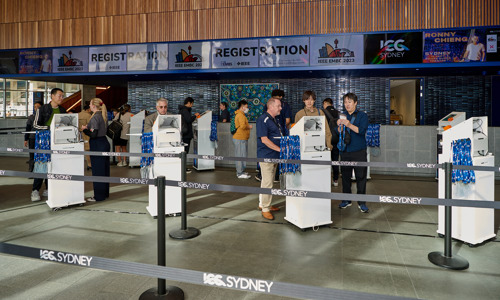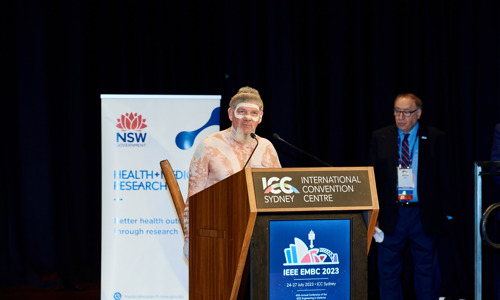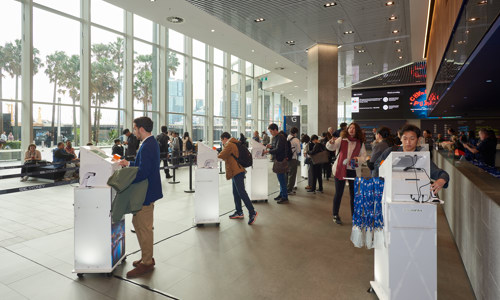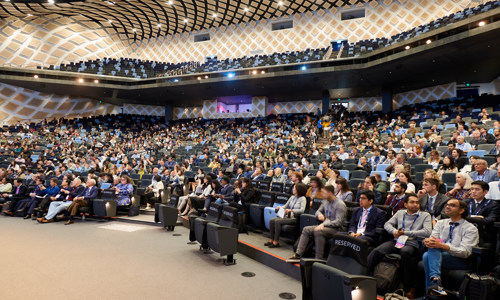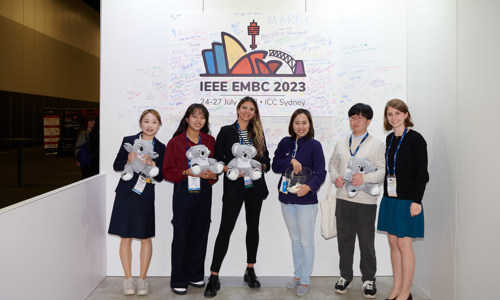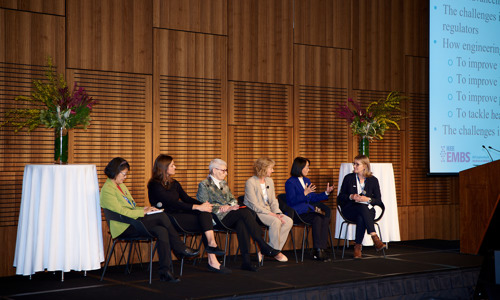45th Annual International Conference of the IEEE Engineering in Medicine and Biology Society (EMBS)
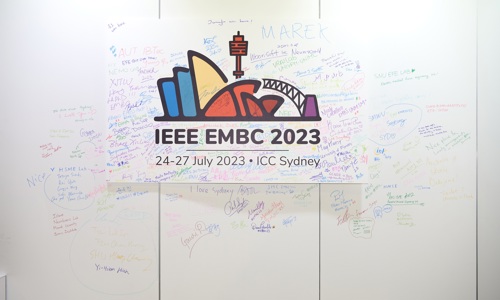
OVERVIEW
24th – 27th July 2023
International Convention Centre (ICC)
Sydney, Australia
With a theme of 'Equitable access to healthcare for all', the 45th Annual International Conference of the IEEE Engineering in Medicine and Biology Society (EMBS) attracted more than 2300 delegates, from 56 countries, representing a strong return to pre-pandemic in-person attendance.
A comprehensive program showcasing MedTech sector innovations from Australia and around the world was offered, including three plenary talks,12 keynote presentations - four of which showcased Australian innovation and MedTech companies - more than 600 presentations, 12 special theme sessions, 30 mini symposia 10 pre-conference workshops and over 1200 posters.
The Australian Biomedical Engineering community chose to partner with Sydney to host this meeting to ensure we maximised attendance from around the world. This was an important once in a generation opportunity for us to amplify our global presence and to raise the profile of biomedical engineering in Australia and New Zealand by showcasing the great research innovations and successful MedTech translation and industries in the region. In Sydney, we achieved that.
Nigel Lovell
IEEE EMBC Conference Chair
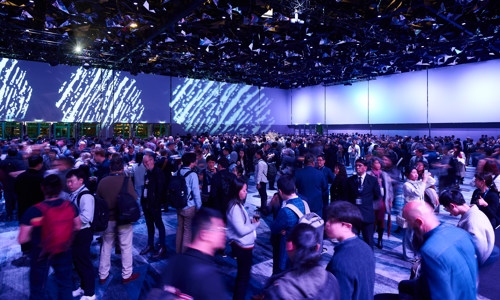
DELIVERING RESULTS
The conference raised the profile of biomedical engineering in Australia and New Zealand by showcasing the world class research innovations and successful medtech translation and industries in the region.
IEEE EMBC met all of IEEE's financial requirements and returned surplus to support the societies important initiatives. The conference was estimated to inject approximately $7.8 million into the local economy.
WHY SYDNEY?
As this was the first time in 20 years that IEEE EMBC would be hosted in Australia, Sydney, our iconic global city, was the obvious host. With the best accessibility in Australia, Sydney made arrivals easy. The conference attracted a truly global delegation of engineers. With participation from diverse backgrounds, including both established and emerging researchers, the conference encouraged novel perspectives, fostering an environment where collaboration and exploration thrived.
Sydney’s walkable harbourside location offered a safe, thriving city that could be easily explored from International Conference Centre Sydney (ICC Sydney) and nearby accommodation.
Sydney was selected as the host for IEEE based on its reputation as an excellent conference destination. Located in the Asia Pacific region meant delegates from around the world had several flight path options to travel to Sydney. A year-round temperate climate meant a July conference in Sydney was enjoying almost as warm weather as the Northern Hemisphere summer. Sydney’s food and beverage scene offered delegates a range of fine dining options including multicultural dining. Sydney blends the harbour’s natural beauty with iconic man made attractions such as the Sydney Harbour Bridge and the Sydney Opera House and is fringed by expansive city parklands and coastal walks. It is an accessible and friendly destination where global delegates are welcomed and can leave having explored the city’s beauty.
Delegates were given the chance to network with some of the brightest minds in the Biomedical Engineering field that attended and spoke at EMBC as well as other attendees. Collaborations and connections were made during the social program.
Sustainability was an important theme for the conference. ARINEX assisted with guiding eco-friendly conference practices to create a sustainable focus. Delegates were encouraged to bring their own satchel bags, writing pads, pens and refillable water bottles. This was supported by the sustainability practices and policies in place at ICC Sydney.
CREATING IMPACT
Women have made substantial contributions to the field of biomedical engineering, and we believe their work should be recognised by our community. Our strategic initiative with regard to promoting women in biomedical engineering will be a cornerstone of our society's mission of applying engineering and technology to advance medicine and biology - and promoting the profession and settling the standard for diversity and inclusion throughout the STEM field. We look forward to continuing to host such forums and expanding them in the future, celebrating the achievements of our colleagues, and encouraging other women to join our profession as well.
Paul Sajda
President of IEEE EMBS
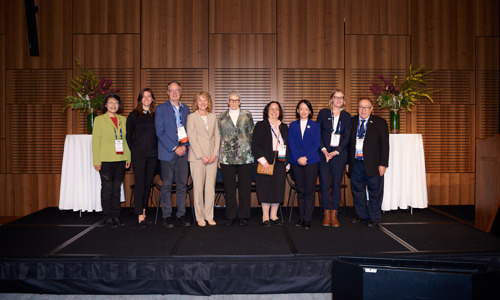
In line with IEEE’s commitment to advancing diversity in the technical profession, the EMBC conference program put a spotlight on increasing Diversity, Equity and Inclusion.
Immediately following EMBC, IEEE EMBS hosted their first Women in Biomedical Engineering Conference (WIBME) in Sydney. IEEE EMBS reported that “it was a resoundingly successful day and night. We celebrated and championed the brilliance of women in Biomedical Engineering and were lucky enough to have four wonderful speakers who are world-renowned women in these fields.”
The dedicated conference was a full day focused on providing women in biomedical engineering the opportunity to network with industry professionals, female academics, researchers and clinicians. The day included a Women in Engineering lunch and a mentoring session offering advice and career search for women in the industry. EMBS’ strategic initiative included opportunities for delegates to explore career aspirations and explore pathways for advancement through networking with industry experts.
Our conference theme of 'Equitable access to healthcare for all', brought a sharp focus on important topics that would drive sustainable social impact. We included special sessions showcasing how our sector’s future success will be built on the principles of diversity, equity and inclusion in our industry. Drawing on the talents and perspectives of people with different personal, cultural, and disciplinary backgrounds was recognised as essential to the future of healthcare.
Nigel Lovell
IEEE EMBC Conference Chair
Gender equity in the Engineering profession is underrepresented with only 20-30% of women making up global engineering numbers. IEEE EMBS understand the importance of attracting future leaders in the field of biomedical engineering and related industry streams, particularly to support their diversity equity and inclusion goals for the profession. Designed specifically for students, the Lunch with Leaders initiative created opportunities to network with industry experts in their chosen field. This initiative was essential to establishing foundations for the next generation of experts for their community, by providing the chance to explore career aspirations and pathways for advancement.
Fostering participation from established and emerging researchers from diverse cultures and backgrounds showed delegates the benefit of inclusion through different perspectives and approaches. Conference organisers were pleased to be able to offer the opportunity and invitation for a speaker from a low-income country to attend the conference.
Impact Insights
Business Events Sydney (BESydney) in conjunction with the University of Technology Sydney, Business School surveyed delegates attending the Annual International Conference of the IEEE Engineering in Medicine and Biology Society (EMBC) 2023, to measure and understand some of these impacts on delegates and the flow-on effects to the community at large.
